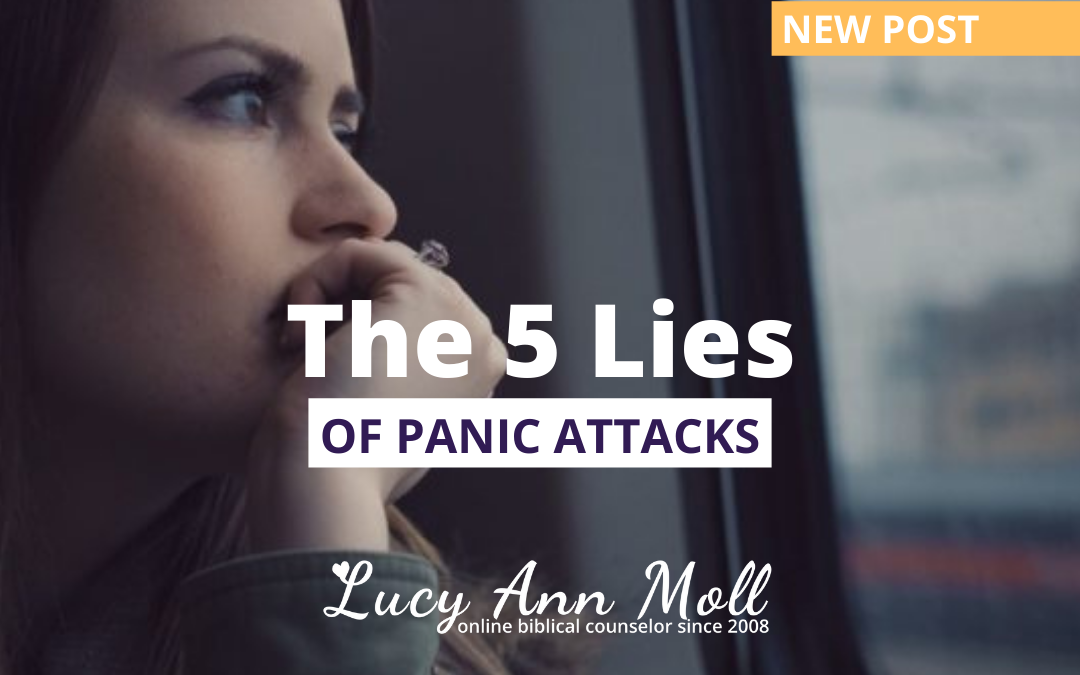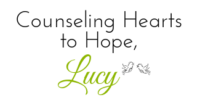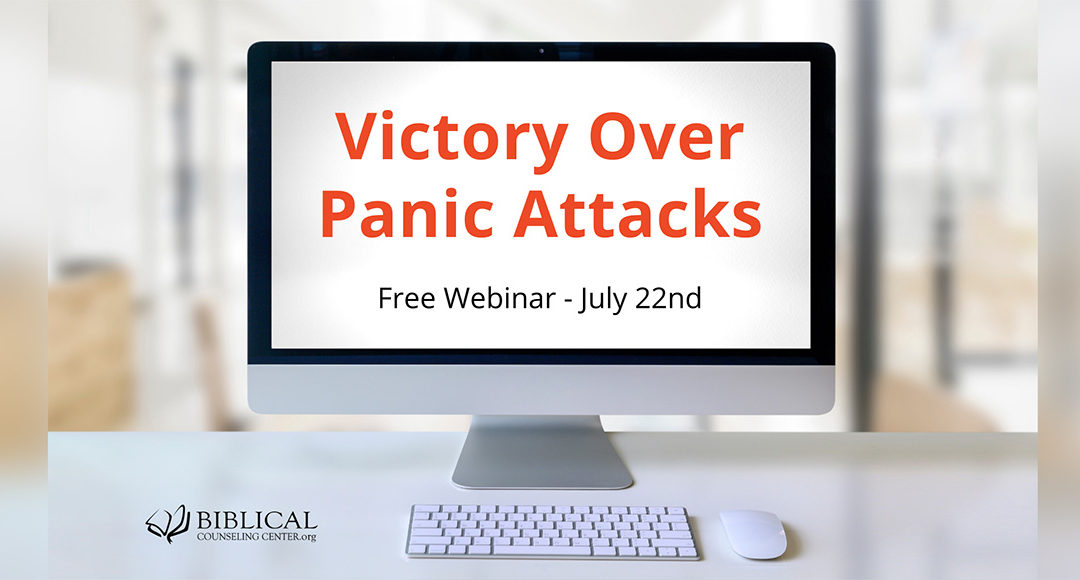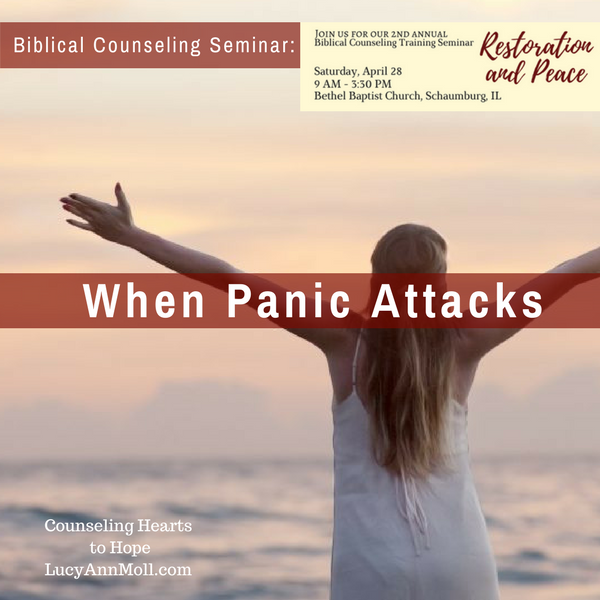
by Lucy | Jul 20, 2021 | biblical counseling |
When panic attacks occur, the sufferer hopes that the terror will stop instantly and never return. This is a certain truth about panic attacks: no one wants them, ever.
Panic attacks are brief episodes of intense dread accompanied by physical symptoms like an irregular or rapid heartbeat and sweaty palms. When you’re in the middle of one, they seem anything but brief.
Let’s uncover the five lies of panic attacks that you need to know, whether you or a loved one has this common condition.[i]
P.S. On Thursday, July 22, at noon CT, I’ll be leading a free live webinar on Victory Over Panic Attacks, and you are invited!
If you cannot make that date, no worries; You can get the replay along with helpful handouts including action plans! But to get them, you must register for the webinar. The spots are filling up, so act now.
REGISTER FOR THE FREE WEBINAR
Lie #1: If God loved me, He would take this away.
TRUTH: God loves you despite your fear.
Knowing the link between fear and panic attacks helps us to gain an accurate view of our anxiety, and to rest in the truth that God loves His children, especially those of us who fight fear (1 Thess. 5:14).
Fear isn’t all bad. It is a God-given emotion that alerts us to danger, real or perceived. Anxiety is what we feel when our body is responding to the emotion of fear.[ii] It is the mind and body’s reaction to stressful situations.
When you or I face a danger (real or perceived), our body releases adrenaline and other chemicals into the bloodstream, setting off a series of physical responses to ready us to act.
For various reasons, some people are more likely to develop panic attacks.[iii] Women are more prone to developing panic attacks than men.
Also, there is a strong genetic link. For instance, people with a close biological family member with panic disorder are up to eight times more likely to develop this condition.
No one wants to be anxious, of course. Yet when we get to the heart of anxiety, we learn what we truly value.
Remember that “you did not receive a spirit that makes you a slave again to fear, but you received the Spirit of sonship. And by him we cry, ‘Abba, Father’” (Romans 8:15).
This can be incredibly empowering. In Christ, you have been set free (Gal. 5:1) and made a child of God, even though you may feel like a slave to the fear of panic attacks.
Lie #2: Only medication can help me, OR if I were a stronger Christian, I wouldn’t need meds.
TRUTH: A balanced approach to medication is wise.
As many more Americans have turned to anxiety prescription medication since the coronavirus crisis to calm their nerves,[iv] we may wonder about their role in easing panic attacks.
- Is medication the best option to address panic?
- Should we avoid medication altogether?
- Does using medication mean I’m a weak Christian?
First, no medication cures panic attacks. Rather, medicine can work to change the way that the body responds to fear, usually by slowing a normal biological process that is responding to a perceived danger.
Second, no medication can change our thinking. Only counseling can do that, whether from a friend or a biblical counselor or through self-counsel.
Medication can address these responses sometimes, but it does not deal with the heart. As a top article at Biblical Counseling Center’s websites puts it:
Medicine can change the way anxiety feels, but it can’t address the object of your fear. One of the things we all must realize is that the Creator God designed our bodies to feel fear and for our bodies to respond with energy to put us into motion. Simply muting the intensity of those bodily reactions and feelings by medically suppressing the natural chemical reactions in otherwise healthy bodies doesn’t solve one’s anxious thought patterns.[v]
The counselors at Biblical Counseling Center believe that the decision of whether or not to take anxiety medication is a personal one that is best made in consultation with your physician. Contrary to the popular myth, Biblical Counselors are not opposed to all psychiatric medicine use.
Whether you use medication or have decided against it, or if your loved ones have struggled over your decision, please know that you are never alone. You might remind yourself of this verse when you battle fear:
“The Lord is my light and my salvation;
whom shall I fear?
The Lord is the stronghold of my life;
of whom shall I be afraid?” (Psalm 27:1)
Lie #3: Panic attacks are mostly a physical problem.
TRUTH: The body and mind are intertwined.
The bodily responses to panic are well known: your heart beats double-time, you may be shaky, maybe even lightheaded, and it may feel like a bear is sitting on your chest, metaphorically (or you’d really have something to worry about, right?).
You might also have chills, numbness in the fingers and toes, sweaty palms, and other panic symptoms that sometimes seem to come out of the blue.
Since panic symptoms are physical, this means panic attacks are mostly a physical problem, right? The truth is, while anxiety is entwined with our bodies, it originates in anxious thinking.
“For as [a man] thinks in his heart, so is he” (Proverbs 23:7, NKJV).
What we think, believe, and desire in our hearts is what we do. The heart is the immaterial part of us. It consists of our thoughts, emotions, and will. So, if we imagine that we are in danger, we may run and hide, and have a rapid heartbeat and other bodily responses to fear.
So scary are these symptoms that we may seek emergency medical help. Each year millions of Americans with anxiety-induced panic attacks visit a hospital emergency department complaining of chest pain, trouble breathing, and dizziness, fearing a heart attack.
A researcher found that “anxiety contributed to chest pain experienced by 30 to 40 percent of low-risk patients seen in hospital emergency departments.” [vi] Of course, it is wise that someone showing symptoms indicating a life-threatening disorder would seek emergency care.
As we address our fear, we can learn to slow our anxious thoughts that feed panic attacks.
Lie #4: I just need to do better to avoid my triggers.
TRUTH: Avoiding the situations you fear deepens your fear, so don’t do that.
Let’s start with a definition of a trigger. A trigger is a situation, location, or person that reminds someone of a past or current difficulty,[vii] even a panic attack.
This lie suggests that if we stay away from a feared situation – flying, heights, spiders, driving, and so on – then we will be happier and have more peace because we’ll be panic-free.
But the problem is not the trigger per se. It is our heart response to it. What we fear controls us. Andrea Lee explains it this way:
When we label someone or something a “trigger,” we shift the place of emotional control from our own heart to an external object. The connection between an event and emotion can mistakenly lead us to think the trigger is a cause. Actually, we have developed habits of thoughts in response to pain that continues to lead to these predictable emotional conditions.[vii]
The more we avoid our fears, the stronger they may become. In fact, a panic attack is a one-step-removed problem. When we focus on our physical responses to fear, it is easy to lose sight of our real problem; that is, a habit of anxious thinking.
When we repeatedly think about fearful events that may happen, we unintentionally train our thoughts toward hypervigilance and nervousness. When this habit is formed, it doesn’t take much to have another panic attack.
Scripture informs us to “take every thought captive to obey Christ” (2 Cor. 10:5). This means we need to unlearn our fear habit and rely on God to provide everything we need for victory.
To accomplish this, we can develop action plans that help us before, during, and after a panic attack. In the coming weeks, we’ll tell you more about these action plans that can help you break free from fear.
Lie #5: Counseling can’t help me, it’s a lost cause.
TRUTH: The right counseling that is based on love and truth brings freedom.
No one is beyond hope. While we’ve all had seasons when we feel like giving up, God’s grace is sufficient for us to believe the Gospel and to put our faith into action.
Biblical counseling points us to the timeless and trustworthy truths of God’s Word.
At BCC, we often say, “faith is believing the Word of God and acting upon it, no matter how I feel, knowing that God promises a good result.”
When we face our fear of having a panic attack, we need to make a choice to believe God and his care for us even in the event of another panic attack.
Basically, we need to practice biblical truth, especially Phil. 4:4-9. This passage tells us to rejoice, pray, give thanks, guard our hearts and minds, think about the good things of God, and practice the joyful attitude and living that that apostle Paul had shown believers.
And it ends with this promise: “the God of peace will be with you.”
As we face our fear God’s way, His truth replaces the lies of panic attacks, and we learn the true way of peace:
“You keep him in perfect peace whose mind is stayed on you, because he trusts in you” (Isaiah 26:3).
[i] Every year, up to 11% of Americans experience a panic attack. Approximately 2% to 3% of them go on to develop panic disorder. (Cleveland Clinic, “Panic Disorder”)
[ii] Tim Allchin, “How Jesus Addressed Fear, Worry, and Anxiety,” October 1, 2019
[iii] Katherine Star, PhD, “Panic Disorder Risk Factors,” December 4, 2020
[iv] Bruce Golding, “More Americans Turning to Anxiety Medication amid Coronavirus Pandemic,” May 25, 2020
[v] Tim Allchin, “Should Christians Use Anti-Anxiety Medication?” October 15, 2019
[vi] Indiana University, “Heart Attack or Panic Attack?” April 15, 2019
[vii] Andrea Lee, “Troubled by Triggers,” March 20, 2018

by Lucy | Aug 29, 2020 | emotions
When fear gets the upper hand, and we struggle to know what to do, it may help to have a plan in place. This method helps to calm your anxious feelings that flow from your thoughts. Does it “work” every time you’re afraid? No, of course not. Will is help you understand your emotion and learn how to respond to it wisely? Yes!
MAIN POINT: We can learn to conquer fear as we trust God and apply his truth to our minds.
This article appeared first here at Biblical Counseling Center, where I am on staff providing counseling by video to people all over the world.
Where fear flourishes, there your heart will be also.1
From a mild sense of unease to full-blown panic, fear is an emotion most of us would rather live without. It communicates that someone or something we care about is being threatened or that we might lose it. Fear shows us what we value most.
Consider these three folks who are afraid.
In each case, try to figure out what they each value most.
- Dolores’s elderly mother has dementia and is in the memory care unit of a health facility, which so far has kept its patients and workers safe from COVID-19. Nonetheless, she loses sleep worrying night after night, fearing for her mother’s well-being.
- Breanna has packed her high school schedule with advanced placement and dual-credit classes, hoping to gain admission to a high-ranking university. She fears her friends might make fun of her if she attends a community college.
- John just learned that his company is hiring new workers in his department and is wondering if he’ll be laid off. If he lost his job, how would he make rent and pay utilities?
Fear is very real, and it can keep us from functioning in our daily lives. So how can we calm our fears?
1. Identify your emotion as fear.
Sometimes, identifying an emotion is not as easy as it sounds. You may feel uneasy or nervous or freaked out; you may also feel overwhelmed or hurt. Is fear the most accurate descriptor?
If you’re not sure, ask yourself if you feel like pulling away from people or clinging to them. This reaction is a hallmark of fear: it prods us to seek safety, security, and certainty.
EXAMPLES: A teen who’s afraid of getting judged by friends at church may decide to skip the in-person service and watch the live stream instead; A guy who fears that his girlfriend is going to dump him may respond by showering her with gifts and sending her one text after another.
2. Examine your fear like a scientist.
Once you’ve identified your emotion as fear, examine what is going on by asking yourself a host of questions (you may discover it helps to write down your answers):
Is there a place connected to the fear? Perhaps it is linked to your workplace or to a room in your home, or a place in your town. For the longest time, after I was attacked by a dog at age 8, I could not walk down Bellforte Avenue, near where it happened. Just going near that street caused my heart to pound like a drum.
Is there a certain time that unnerves you? Some of us don’t like a certain holiday or the anniversary of a family member’s death date because it brings uneasy memories of painful events.
Is there a type of activity or a particular person linked to the fear you feel? One of the people I counseled told me she becomes greatly alarmed when she hears sirens. She connects the sound of them to the untimely death of her baby.
3. Evaluate your fear.
Begin by considering your reaction. Ask yourself, is my reaction godly and constructive, or is it sinful and destructive? An example of constructive concern is studying for an algebra exam. You want a good grade so you memorize formulas and rework problems until you are confident you know the material.
In a similar way, David in the Old Testament had a constructive reaction when he faced Goliath (1 Sam. 17). He chose the best weapon for him to defeat the giant (a sling and five smooth stones), and he came in the name of the Lord Almighty, the God of Israel, who had promised victory over the Philistines. His courageous reaction to Goliath sharply contrasted the reaction of the army of Israel, who cowered in fear.
Biblical truth gives us reason to hope and teaches us to turn to God. “No matter what the danger or what we are valuing, God can be trusted with our treasures, and every fear ought to drive us straight toward the Lord in prayer, obedience, and fellowship!” [2]
Next, ask yourself how likely it is that what you fear will actually happen? Let’s say you fear that a routine medical exam might suggest the presence of cancer. Consider the likeliness of a bad result; while possible, it is very low, and worrying about it would be a waste of your energy (Matt. 6:34).
Finally, ask yourself, what is the worst that could happen? When my relatively new refrigerator needed repair for the third time three months in a row, I asked myself this exact question and realized that the worst was the hassle of another repair or getting another fridge, which was under warranty (thankfully). My evaluation gave me a sense of relief, not dread.
4. Act wisely in response to your emotion.
When you identify, examine, and evaluate your fear, you may come to a realization that it was not a big deal after all.
Conversely, you may detect a troubling pattern. For instance, you may notice you have a tendency to worry, to look to people for their approval, to avoid certain situations (e.g., riding an elevator) for fear of a panic attack, and so on.
In any case, it is wise to act in response to fear in godly ways. Here are a few of them:
Train yourself to turn to Scripture. A few excellent passages to read regularly are Phil. 4:4-9, Matt. 6:25-34, Luke 12:22-34, Psalm 23, and Psalm 27.
Practice deep breathing and other healthy habits. Inhaling and exhaling slowly helps us to relax. Other healthy habits are giving yourself ample time to get from place to place, unplugging from the internet, and steering clear of computer screens late in the day, which may interrupt sleep. Additionally, you might incorporate or begin regular exercise (as always, check with your doctor), good nutrition, and a bedtime routine. You’ve already heard healthy tips; decide which one you’ll begin to make a habit.
Face your fears wisely. Are you afraid to ask your boss for a raise? Are you avoiding a family member who unnerves you? Does the idea of flying in an airplane cause your heart to skip a beat? To face your fears wisely, be sure to examine and evaluate them, and have a thought-out plan. Discuss your plan with a trusted Christian friend and loved ones who can support you. You may also consider talking with a biblical counselor.
Hope for a Peace-Filled Life
What you fear need not rule your life. A method to calm your fears helps you to understand that fear reveals your treasure and provides a plan to identify, examine, and evaluate it and to respond to it wisely in accordance with Scripture.
When you handle this negative emotion in the right way, your trust in God increases, and others will begin to ask you the secret that the Apostle Paul had come to know.
“The things you have learned and received and heard and seen in me, practice these things, and the God of peace will be with you” (Phil. 4:9).
[1] This quote comes from the excellent book Untangling Emotions by J. Alasdair Groves and Winston T. Smith (Wheaton, IL: Crossway), 2019, 153. It is a play on Matthew 6:21, which reads, “where your treasure is, there your heart will be also.” The book presents an identify-examine-evaluate-act approach to engaging every emotion. I highly recommend it to those who provide and receive counseling.
[2] Ibid., 160.

by Lucy | Aug 2, 2019 | biblical counseling, Counselor Resources |
No one’s life turns out according to plan, right? Not yours. Not mine. In fact, I wouldn’t have chosen parts of my story if I were writing it. Would you change parts of your story too?
This article appeared first here. As you read on, you’ll see I have the Best. Job. Ever. as a biblical counselor with Biblical Counseling Center. I get to counsel people all over the world from my home office through the wonderful technology of FaceTime/Skype/Zoom/email. Plus, I show train other biblical counselors to reach the hurting.

Wonderfully, the all-knowing Author composed every detail of my life and yours, putting us right where he wants us, giving grace to face whatever came our way. So here I am, a grandma and a doctoral student, meeting hurting women all over the world through the technology of video-conferencing. I am shepherding their hearts with compassion and the timeless truth of Scripture.
Helping hurting women sounds like a happy chapter in a full life, right? It is. But it comes by way of pain, as do many good things.
Childhood, Interrupted
Climbing trees, doing cartwheels, and going to school—these activities filled my days. My older brother and I got along all right, but my mom seemed preoccupied much of the time, chain smoking and watching “Day of Our Lives” and game shows. My dad rarely smiled. This saddened me.
Things got scary on “the night of the twisted chairs.” There was yelling and crying in the living room and when I went to check, my mom and brother shooed me to my bedroom. My dad had gone berserk, tossing and bending chairs.
The next day my parents’ psychiatrist met them at the hospital, and my dad eventually received the diagnosis of manic depression, which is the old term for bipolar 1. I remember thinking, “I’m the daughter of a psychotic.” Melodramatic? Yes! I was 14 and confused and hurting.
I learned I was vulnerable and had little control. But I eventually understood that God knows what he is doing even when I don’t.
God “Shows Up”
High school and college swooshed by. I switched my major from psychology to journalism, met my future husband, graduated, and married. One day I went to the library for books on decorating but came home with a thin volume called Basic Christianity by John Stott. I read it in a few hours.
Convicted that I was a hopeless sinner, I confessed my need of the Savior and received Jesus by faith alone. This is not what you’d expect of a good Catholic girl, is it? God had better plans. That God would have mercy on me rocked my world. He changed my life from the inside.
A few years later, my world turned upside down again. Out of nowhere, it seemed, panic attacked me and my heart beat triple-time, sweat beaded my forehead, and my knees felt wobbly like Jell-O. Long story short, my faith in Jesus and help from my doctor pointed me in the right direction. Retraining my thoughts by the Word, and lots of practice, provided what I needed to overcome panic attacks. (I share my story and solutions to panic in my mini-book Help! I Get Panic Attacks, scheduled to publish this fall.)
Through this trial, I learned God is with me, especially in terrifying panic, and changing me into the likeness of Christ.
A Call, Answered
Three children later, I was back in school studying pastoral care to women online through Western Seminary in Portland, OR, answering a call to shepherd the hearts of hurting Christian women. My hope: to reach the women at church and in the community, who don’t get involved in women’s Bibles studies, teas, and retreats … because they are hurting.
Later I discovered a book by Jay Adams, the founder of the modern biblical counseling movement, and got biblical counseling training too. Five years ago, I joined Biblical Counseling Center’s staff, continuing to shepherd hurting women and families in person and online.
And forever a student, crazy me is on schedule to receive my doctorate in biblical counseling in May. I tease my husband that soon he’ll have to call me Doctor Lucy. He thinks that’s funny.
I and many biblical counselors anchor our ministries on 2 Corinthians 1:3-4.
“ Praise be to the God and Father of our Lord Jesus Christ, the Father of compassion and the God of all comfort, who comforts us in all our troubles, so that we can comfort those in any trouble with the comfort we ourselves receive from God.”
Truly, God is the Author writing our stories according to his best plan. For hurting women, he provides other women who lovingly shepherd them, listening deep and giving counsel that encourages them to wholeness in him. And so, it seems, God planned my story so I could meet hurting women in theirs. He’s not finished with us yet, right? I wonder what’s next.
P.S. Many people contact me for counseling for panic attacks, phobias, OCD, post-traumatic stress, and other life stresses. If you or someone you love might want counseling, simply contact me via this easy form. Reduced fees available. 🙂











